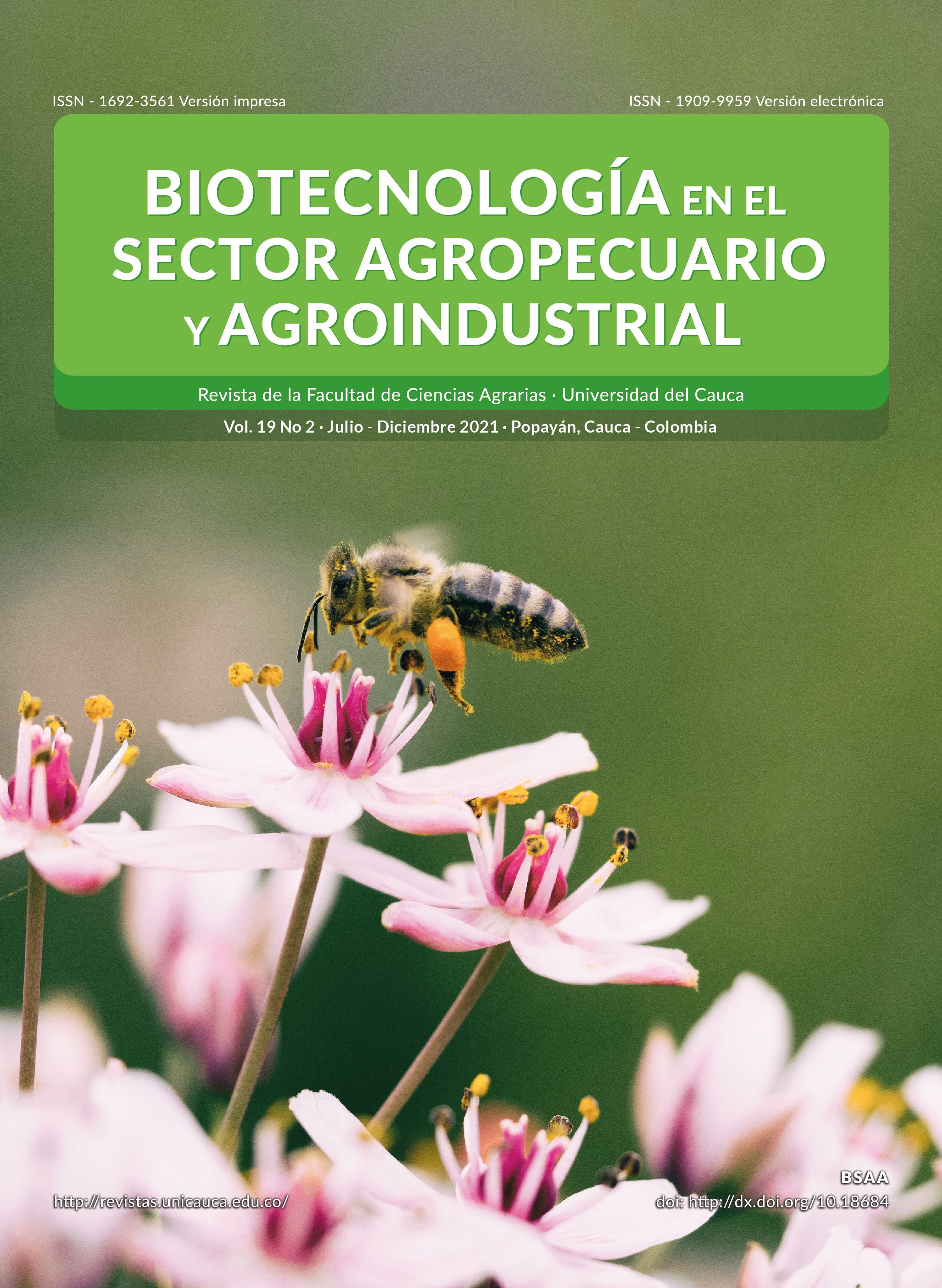Degradación enzimática de mucílago de Coffea arábica L., para la producción de café suave lavado
Resumen
La eliminación del mucílago de café requiere de la degradación de la pectina durante la fermentación, necesaria para la obtención del café suave lavado. Esta etapa representa gran parte del tiempo de procesamiento, por lo que el uso de pectinasas es importante para acelerar la remoción de mucílago y lograr la eficiencia en esta operación. Actualmente, se utiliza una pectina liasa, sin embargo, se desconoce si su aplicación en concentraciones inferiores a las recomendadas y la recirculación de los fluidos resultantes para nuevas tandas de café generan efectos sobre el desarrollo del proceso y la calidad de la bebida. Para determinar este efecto se utilizó un Diseño de Bloques al Azar en arreglo factorial 2x3+1 con dos concentraciones de enzima, tres ciclos de aplicación, original y recirculación y un testigo, que fue la fermentación tradicional. Se realizó el Análisis de varianza y prueba de Tukey, cuando se encontró efecto significativo. Los procesos en las masas de café transcurrieron entre 22 y 27 °C, el pH entre 5,6 y 3,5. Los resultados indicaron diferencias en el tiempo de degradación, el cual se redujo respecto al testigo, entre 79 y 85% con el primer uso de la enzima y entre 22 y 23 % para el uso de los primeros fluidos drenados obtenidos. La calidad del café no presentó diferencias significativas, con puntajes SCA entre 81,18 y 81,80. Las características de pH, viscosidad y volumen de los fluidos drenados que contenían la enzima variaron de acuerdo con la concentración y el tipo de aplicación, obteniendo mayor volumen y menor viscosidad y acidez para los resultantes de la aplicación inicial. El uso de esta pectinasa es una alternativa para degradar el mucílago de café, ya que no afecta la calidad y disminuye el tiempo de proceso independiente del ciclo de aplicación utilizado.
Descargas
Disciplinas:
Agroindustria, Poscosecha, BiotecnologíaLenguajes:
Español; CastellanoReferencias bibliográficas
AHMED, ASIA; SOHAIL, MUHAMMAD. (2020). Characterization of pectinase from Geotrichum candidum AA15 and its potential application in orange juice clarification. Journal of King Saud University – Science 32 955–961.https://doi.org/10.1016/j.jksus.2019.07.002
ASGARI, K; LABBAFI, M; KHODAIYAN, F; KAZEMI, M; HOSSEINI, S. (2020). High-methylated pectin from walnut processing wastes as a potential resource: Ultrasound assisted extraction and physicochemical, structural and functional analysis. Elsevier, International Journal of Biological Macromolecules, 152 1274-1282.https://doi.org/10.1016/j.ijbiomac.2019.10.224
AVALLONE, S; GUIRAUD, J-P; GUYOT, B; OLGUIN, E; BRILLOUET, J‐M. (2000). Polysaccharide Constituents of Coffee-Bean Mucilage. Journal of Food Science 65(8), 1308-1311. https://doi.org/10.1111/j.1365-2621.2000.tb10602.x
B, SIRIDEVI G; HAVARE, DEVENDRA; K, BASAVARAJ; MURTHY, PUSHPA S. (2019). Coffee starter microbiome and in-silico approach to improve Arabica coffee. LWT Food Science and Technology, 114, 108382.https://doi.org/10.1016/j.lwt.2019.108382
CÓRDOBA-CASTRO, NANCY-MARLENY Y GUERRERO-FAJARDO, JESÚS-ESTEBAN. (2016). Caracterización de los procesos tradicionales de fermentación de Café en el departamento de Nariño. Biotecnología En El Sector Agropecuario Y Agroindustrial, 14(2), 75–83. https://doi.org/10.18684/BSAA(14)75-83
DADI, DESSALEGN; MENGISTIE, EMBIALLE; TEREFE, GUDINA; GETAHUN, TADESSE; HADDIS, ALEMAYEHU; BIRKE, WONDWOSSEN; BEYENE, ABEBE; LUIS, PATRICIA; VAN DER BRUGGEN, BART. (2018). Assessment of the effluent quality of wet coffee processing wastewater and its influence on downstream water quality Ecohydrol. Hydrobiol, 18, p. 201-211. https://doi.org/10.1016/j.ecohyd.2017.10.007
DA MOTA, MARCELA-CAROLINE; BATISTA, NÁDIA-NARA; RABELO, SANCES, MARIANE-HELENA; RIBEIRO, DIEGO-EGIDIO; BORÉM, FLÁVIO-MEIRA; SCHWAN ROSANE-FREITAS. (2020). Influence of fermentation conditions on the sensorial quality of coffee inoculated with yeast. Food Research International ,136, 109482.https://doi.org/10.1016/j.foodres.2020.109482
DE MELO-PEREIRA, GILBERTO; DE CARVALHO-NETO, DÃO-P; MAGALHÃES-JÚNIOR, ANTONIO-I; VÁSQUEZ-ZULMA, S; MEDEIROS, ADRIANE B-P; VANDENBERGHE, LUCIANA P-S; SOCCOL, CARLOS-R. (2019). Exploring the impacts of postharvest processing on the aroma formation of coffee beans – A review. Food Chemistry, 272, 441-452.https://doi.org/10.1016/j.foodchem.2018.08.061
DE OLIVEIRA-LIRA, RODRIGO; LOPES-DIAS, JÔNATAS; SOARES-DA SILVA, OSMAR; SOUZA-PORTO, TATIANA. (2018). Immobilization of pectinase from Aspergillus aculeatus in alginate beads and clarification of apple and umbu juices in a packed bed reactor. Food and Bioproducts Processing 109, 9-18.https://doi.org/10.1016/j.fbp.2018.02.005
HAILE, MESFIN & KANG, W-H. (2019). Isolation, Identification, and Characterization of Pectinolytic Yeasts for Starter Culture in Coffee Fermentation. Microorganisms. MDPI-Microorganisms, 7(10), 401.https://doi.org/10.3390/microorganisms7100401
HE, YULAN; PAN, LI; WANG, BIN. (2018). Efficient Over-expression and Application of High-performance Pectin Lyase by Screening Aspergillus niger Pectin Lyase Gene Family. Biotechnology and Bioprocess Engineering, 23(6), 662-669. https://doi.org/10.1007/s12257-018-0387-1
HOSSEINI, SEYED-SAEID; KHODAIYAN, FARAMARZ; MOUSAVI, SEYED, MOHAMMAD-E; AZIMI, SEYEDEH-ZAHRA; GHARAGHANI, MOHAMMAD. (2020). Immobilization of pectinase on the glass bead using polyaldehyde kefiran as a new safe cross-linker and its effect on the activity and kinetic parameters. Food Chemistry, 309, 125777.https://doi.org/10.1016/j.foodchem.2019.125777
JOHN, JULIANA; KAIMAL-SURENDRANATHAN, K-K; SMITH, MATTHEW-L; RAHMAN, PATTANATHU-K.S.M; VELAYUDHAPERUMAL-CHELLAM, PADMANABAN. (2020). Advances in upstream and downstream strategies of pectinase bioprocessing: A review, International. Journal of Biological Macromolecules, 162, 1086–1099.https://doi.org/10.1016/j.ijbiomac.2020.06.224
KAZEMI, MILAD; KHODAIYAN, FARAMARZ; LABBAFI, MOHSEN; HOSSEINI, SEYED-SAEID; HOJJATI, MOHAMMAD. (2019). Pistachio green hull pectin: Optimization of microwave-assisted extraction and evaluation of its physicochemical, structural and functional properties, Food Chemistry, 271 663-672.https://doi.org/10.1016/j.foodchem.2018.07.212
KC, SUDEEP; UPADHYAYA, JITENDRA; JOSHI-DEV, RAJ; LEKHAK, BINOD; CHAUDHARY-KUMAR, DHIRAJ; PANT-RAJ, BHOJ; BAJGAI-RAJ, TIRTHA; DHITAL, RAJIV; KHANAL, SANTOSH; NIRANJAN, KOIRALA; RAGHAVAN, VIJAYA. (2020). Production, Characterization, and Industrial Application of Pectinase Enzyme Isolated from Fungal Strains. Fermentation. MDPI-Fermentation 6(2), 59. https://doi.org/10.3390/fermentation6020059
KHARAZMI, SARA; TAHERI-KAFRANI, ASGHAR; SOOZANIPOUR, ASIEH. (2020). Efficient immobilization of pectinase on trichlorotriazine-functionalized polyethylene glycol-grafted magnetic nanoparticles: A stable and robust nanobiocatalyst for fruit juice clarification. Food Chemistry, 325, 126890.https://doi.org/10.1016/j.foodchem.2020.126890
KOSHY, MITTU & DE, SALAMUN. (2019). Effect of Bacillus tequilensis SALBT crude extract with pectinase activity on demucilation of coffee beans and juice clarification. Journal of Basic Microbiology, 59(12), 1185-1194.https://doi.org/10.1002/jobm.201900321
MENCHÚ-ÁLVAREZ, CARLOS-MAURICIO. (2019). Evaluación De La Remoción Del Mucílago De Café Asistido Enzimáticamente Y Sus Efectos En El Presecado Del Grano En Pergamino, [Trabajo de Graduación Ingeniería Química]. Guatemala, Universidad de San Carlos de Guatemala (USAC) p-80.http://www.repositorio.usac.edu.gt/13998/1/Carlos%20Mauricio%20Mench%C3%BA%20Alvarez.pdf
MOHAMMADIA, MARYAM; REZAEI-MOKARRAMA, REZA; SHAHVALIZADEHB, RAHIM; SARABANDIC, KHASHAYAR; LIMD LOONG-TAK; HAMISHEHKARE, HAMED. (2020). Immobilization and stabilization of pectinase on an activated montmorillonite support and its application in pineapple juice clarification, Food Bioscience, 36, 100625. https://doi.org/10.1016/j.fbio.2020.100625
OUMER, OLIYAD-JEILU & ABATE, DAWIT. (2018). Screening and Molecular Identification of Pectinase Producing Microbes from Coffee Pulp. BioMed research international, 2018, 2961767. https://doi.org/10.1155/2018/2961767
PATIDAR-KUMAR, MUKESH; NIGHOJKAR, SADHANA; KUMAR, ANIL; NIGHOJKAR, ANAND. (2018). Pectinolytic enzymes‑solid state fermentation, assay methods and applications in fruit juice industries: a review. JBIC Biotech (2018) 8:199 24 p. https://doi.org/10.1007/s13205-018-1220-4
PEÑUELA-MARTÍNEZ, AIDA-ESTHER; PABÓN-USAQUÉN, JENNY; RODRÍGUEZ-VALENCIA, NELSON; OLIVEROS-TASCÓN, CARLOS-EUGENIO. (2010). C. E. (s. f.). Evaluación De Una Enzima Pectinolítica Para El Desmucilaginado Del Café. Cenicafé 61 (3): 241-250. http://infocafes.com/portal/wp-content/uploads/2015/12/Evaluaci%C3%B3n-de-una-enzima-pectinol%C3%ADtica-para-el-desmucilaginado-del-caf%C3%A9.pdf
PEÑUELA-MARTÍNEZ, AIDA-ESTHER; SANZ-URIBE, JUAN-RODRIGO; PABÓN-USAQUÉN, JENNY-PAOLA. (2012). Método para identificar el momento final de la fermentación de mucílago de café. Cenicafé 63 (1): 120-131. https://biblioteca.cenicafe.org/bitstream/10778/517/1/arc063(1)120-131.pdf
PEÑUELA-MARTÍNEZ, AIDA-ESTHER; ZAPATA-ZAPATA, ARLEY-DAVID; DURANGO, RESTREPO, DIEGO-LUIS. (2018). Performance Of Different Fermentation Methods And The Effect On Coffee Quality (Coffea Arabica L.) (N. o4). 13(4), 465-476. https://doi.org/10.25186/cs.v13i4.1486
PUERTA-QUINTERO, GLORIA-INÉS. (2009). Efecto de enzimas pectolíticas en la remoción del mucílago de /Coffea arábica/ L. según el desarrollo del fruto. Cenicafé 60 (04): 291-312. http://infocafes.com/portal/wp-content/uploads/2015/12/efecto-de-enzimas-pectoliticas.pdf
RAMDAS-SHET, ANIL; VIJAYKUMAR-DESAI, SHIVALINGASARGA; ACHAPPA, SHARANAPPA. (2018). Pectinolytic Enzymes: Classification, Production, Purification And Applications. Research Jounal Of Life Sciences,Bioinformatics,Pharmaceutical and Chemical Sciences, RJLBPCS 4(3) P 33712-348 12 p. DOI: 10.26479/2018.0403.30
SCAA - SPECIALTY COFFEE ASSOCIATION OF AMERICA (2015). SCAA Protocols | Cupping Specialty Coffee. http://www.scaa.org/?page=resourcesyd=cupping-protocols
TIBADUIZA-VIANCHÁ, CARLOS-ALFONSO; RAMÍREZ-GÓMEZ CÉSAR-AUGUSTO; SANZ-URIBE, JUAN-RODRIGO; OLIVEROS-TASCÓN, CARLOS-EUGENIO. (2018) Análisis y diseño de beneficiaderos ecológicos comunitarios para café proyecto Manos al agua. Cenicafé. ISBN: 978-958-8490-33-5. 105 p.https://www.wur.nl/upload_mm/9/a/1/23d9e62a-7386-462f-9595-28d19f910acd_Beneficiaderos%20Comunitarios-gecomprimeerd.pdf
VELÁSQUEZ, SEBASTIÁN; PEÑA, NESTOR; BOHÓRQUEZ, JUAN-CARLOS; GUTIERREZ, NELSON; SACKS, GAVIN-L. (2019). Volatile and sensory characterization of roast coffees – Effects of cherry maturity. Food Chemistry, 274, 137-145. https://doi.org/10.1016/j.foodchem.2018.08.127
XU, S-X; QIN, X; LIU, B; ZHANG, D-Q; ZHANG, W; WU, K; ZHANG, Y-H. (2015). An acidic pectin lyase from Aspergillus niger with favourable efficiency in fruit juice clarification. Letters in Applied Microbiology, 60(2), 181-187. https://doi.org/10.1111/lam.12357


 Español
Español Inglés
Inglés





















.png)



